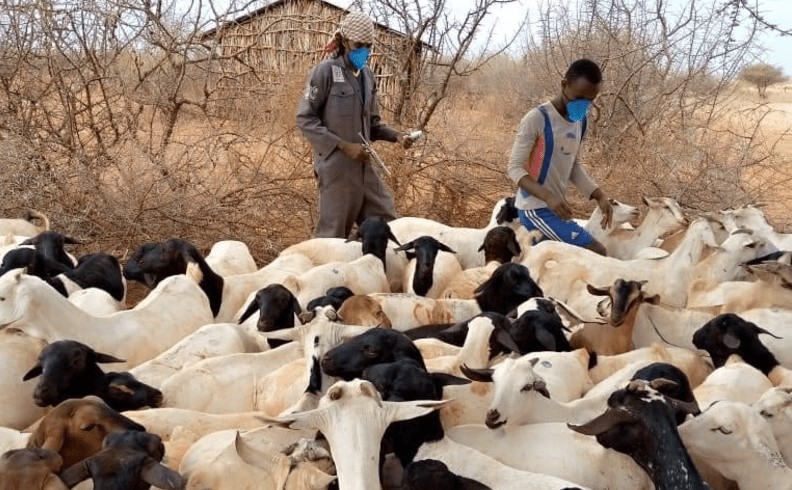Tough times ahead: Proposed tough agriculture laws worry Kenyan farmers

One of the most contentious proposals is the Livestock Bill, which, if passed, will require all livestock to be registered and labelled with detailed identification.
Kenyan farmers are bracing for a tough future as a series of proposed Bills currently in Parliament threaten to raise the cost of food production, potentially pushing millions into deeper economic hardship.
The Bills, which cover a wide range of agricultural practices — from livestock management to water use and agricultural input sales — have ignited widespread concern among stakeholders, particularly small-scale farmers who are already grappling with high costs and inconsistent weather patterns.
More To Read
- CS Kagwe announces policy overhaul for sugar, tea and miraa to protect farmers’ earnings
- Factory farming in Africa: Development banks see it as a good idea, but it’s bad for the climate
- AU calls for rapid tech adoption in farming to shield continent from food crises
- CS Kagwe urges bold reforms in agriculture sector as Intergovernmental Agriculture Forum opens in Naivasha
- Kenya wants China to remove tariffs on coffee, tea, avocados as trade imbalance persists
- City Hall moves to recognise urban farmers in policy review
One of the most contentious proposals is the Livestock Bill, which, if passed, will require all livestock to be registered and labelled with detailed identification, including breed, date of birth, and other information deemed necessary by government officials.
The Bill covers a wide range of animals, from cattle and goats to more unexpected categories like bees and even wild animals kept in captivity.
Under the proposed law, breeders will have to obtain licenses, and anyone who removes or alters an animal's identification without the owner's consent could face hefty fines or imprisonment.
According to the Bill, livestock identification could involve methods such as ear tags, tattoos, or even electronic transponders, depending on the animal's purpose, whether for local sale or export.
Financial burden
However, the implementation of such a law has raised concerns over the financial burden it could place on farmers.
"We are asking for public sensitisation and consultation on this Bill before it moves forward," said Kimani Ichung'wah, the Kikuyu MP who has sponsored the Bill.
Ichung'wah acknowledged that the government's failure to properly engage the public could lead to unintended consequences.
The Kikuyu MP postponed the first reading of the Bill in August, noting that more consultations were necessary to ensure all stakeholders, including farmers, understood its implications.
"Once the sensitisation process is done, we will wait for further guidance on whether the Bills should be withdrawn, revised, or processed with public feedback incorporated," he said.
Educational qualifications
The Agricultural Professionals Registration and Licensing Bill also has the potential to disrupt the industry by setting high educational qualifications for individuals selling critical agricultural inputs such as fertilizers and animal feeds.
Under this Bill, those involved in these businesses would be required to hold at least a diploma or degree in agriculture, and failure to comply could result in fines or imprisonment.
The bill's sponsor, Tigania West MP John Mutunga, argues that the law is necessary to streamline the sector and ensure better-quality inputs.
"We want to professionalise the sector and regulate those involved in selling agricultural products to ensure they have the requisite skills and knowledge," Mutunga said.
However, critics argue that these new qualifications and regulatory requirements could drive up the cost of farming inputs, making agriculture even less affordable for small-scale farmers.
The Bill also proposes the creation of a regulatory body to oversee the registration and licensing of agricultural professionals, adding another layer of bureaucracy and cost to an already struggling sector.
Water resources management
The Water Amendment Bill, another piece of proposed legislation, has drawn strong opposition from farmers who fear that it could leave them at the mercy of private investors in the water sector.
Under this Bill, private-public partnerships (PPP) could be formed for the development and management of water resources, including dams and irrigation systems.
While the government argues that such partnerships could help address water shortages, critics believe the Bill would disproportionately affect small-scale farmers, making it harder for them to access affordable water.
Mary Kathomi, a representative from the lobby group Kilimo Cha Haki, voiced concerns over the potential impact of the Bill.
"Allowing private entities to control water resources could make farming unaffordable and uncompetitive, particularly for small farmers who already struggle with rising costs," she said.
The introduction of these 19 new Bills has sparked fears that they could introduce a cascade of regulations and fees that would drive up the cost of farming, making food production more expensive for both farmers and consumers.
Hunger
The government's own reports show that one million people in the country are still facing hunger despite recent improvements in rainfall and crop production.
Kilimo Cha Haki has raised the alarm over what they see as the unconstitutional nature of the Bills, arguing that they violate several constitutional rights by imposing excessive regulations on farmers and limiting their autonomy.
"These Bills could destabilise Kenya's agricultural sector, violating over 50 constitutional articles. Farmers are already struggling with high input costs, and these Bills could push millions further into hunger," the group warned in a statement.
As Kenya recovers from a prolonged drought, the timing of the Bills could not be worse.
The country had only just begun to see improvements in food production following above-average rainfall in early 2024, which helped reduce the number of food-insecure individuals from 2 million to 1 million.
Yet, the additional regulatory burden could erode any gains made by farmers and ultimately lead to higher food prices for the general population.
With the proposed Bills still under consideration, stakeholders across the agriculture sector are calling for a pause to allow for more in-depth consultation and public engagement.
Top Stories Today















































